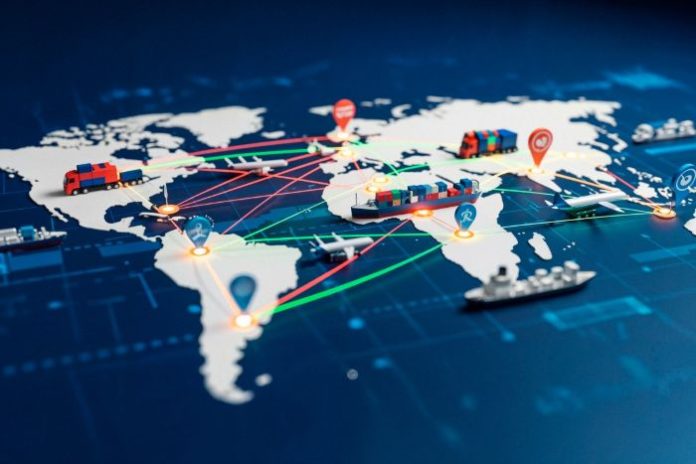In a global economy that is bridging the gap between countries and continents, international shipping, along with domestic freight movements, is the engine that keeps the operations running smoothly. With trillions of dollars being shipped to and from destinations in moving goods every year, the global ecosystem must hit the right balance between risk assessments, transactions, and regulations.
Achieving this balance is only fathomable by integrating the right bank or financial institution into your shipping process. With that in mind, let us explore the relationships between global shipping operations and banking.
Key Takeaways
- International shipping heavily relies on banking for secure transactions, working capital, and compliance.
- Banks facilitate shipping by digitizing trade processes, improving transparency, and ensuring faster settlements.
- Documentation management is crucial; banks help navigate complex paperwork while ensuring compliance with regulations.
- Banks act as risk managers, guaranteeing payments and providing tailored finance solutions to mitigate trade risks.
- Choosing the right banking relationships enhances efficiency in international shipping and ensures regulatory compliance.
Table of contents
What’s the Relationship Between Banking and International Shipping?
While the relationship between the two concepts may not immediately be visible, global shipping and banking are more closely related than you think. Whether you are a shipper, buyer, seller, or freight forwarder, you must rely on banks for purchases, raising working capital, acquiring payment security, and more.
As a result of trade finance and banking products, global trade has reached over $33 trillion in 2024. For most shipping companies, international retailers, and traders, establishing relationships with banks is a strategic move.
The Roles Played by Banks and Banking Products in Global Trade
Banks usually play multiple roles when partnered with international shipping providers. For instance, if you are shipping from USA to Australia, banks can help you navigate the process with the right documentation and enough monetary assistance.
So, if you are a part of the global trade market, you must consider associating with a bank, because they:
#1 Facilitate Shipping Deals Using Technologies
With the rise of digital systems, international shippers can work with banks in smarter ways. By digitising trade processes, companies can shorten settlement timelines, cut compliance costs, and create stronger financial transparency.
To make this possible, shipping companies need technology that links their financial data with banking systems. For example, solutions like Dynamics 365 Finance allow businesses to connect payment workflows, reconcile bank statements automatically, and track compliance in real time. By combining internal financial records with banking transactions, companies gain clearer insights into liquidity, trade finance costs, and regulatory exposure.
When paired with banking partners that offer digital trade solutions, this creates a seamless ecosystem where documents, payments, and approvals move faster and with fewer errors. It is not about replacing banks but about aligning your internal finance system with your bank’s digital infrastructure for better speed, security, and trust.
#2 Provide Necessary Documentation
International shipping of goods globally can often entail a mountain of documentation, such as bills of lading, certificates of origin, commercial invoices, and letters of credit, among other things. Banks can help you navigate the management and authentication of documents, including smart contracts.
Arranging for accurate documentation is pivotal in ensuring your compliance with KYC and anti-money laundering regulations. With the help of banks, you can ensure:
- Your business payments are released only if all the documentation is validated and aligns with the contractual terms
- All the parties involved in the trade contract meet compliance requirements
- Your goods move through customs and regulatory checkpoints seamlessly
Consider using digital trade documentation software that integrates with your bank to streamline the submission, validation, and approval of all your documents. Ensure to review your documentation compliance regularly with your bank so that you can avoid any kind of penalties and holds.
#3 Improve Trust and Credibility
The trade rules and regulations, legal standards, and business norms can vary from country to country, impacting your international shipping deals. According to the IMF and UN, countries with strong international bank corridors can maximize trade volume by 65% compared to countries that don’t.
Banks can act as the backbone for international trade trust, as they are universally trusted institutions in the following ways:
- A bank guarantee from the buyer can give the seller confidence to ship valuable cargo overseas
- Multinational banks can moderate transactions in jurisdictions with weaker legal systems, ensuring everyone plays by the rules
If you are new to importing/exporting, you should rely on your bank for validating the counterparty and use escrow accounts and guarantees to build trust when there is no prior relationship. You should also choose trade finance providers that have a global finance network for better reliability across regions.
#4 Act as Risk Managers
One of the most significant challenges associated with international shipping is risk management.
When managing transactions that span cultures, continents, and regulatory frameworks, having proper risk management is even more crucial, and this is where banks come in. So, it makes sense that nearly 80% of international trade depends on banks or trade finance to manage risks.
Banks generally bridge gaps and prevent issues in global trade by:
- Guaranteeing payments using instruments such as a letter of credit, thus protecting exporters from buyer defaults
- Mitigating credit risks by ensuring that the funds are transferred only after certain milestones or conditions are achieved
- Facilitating finance pre-shipment and post-shipment so that exporters don’t have to wait too long for buyers to clear their payments or for port clearances.
However, you must always work with banks that are experienced in trade finance and have products or services tailored to shipping markets. As a result, you can reduce payment delays and eliminate any non-payment risks.
#5 Offer Insurance and Compliance Support
Any type of shipping, especially international, involves several inherent risks, such as storm damage, cargo theft, and piracy. Other risks that you must be careful about include the evolving regulations and fierce tariff wars. In such a scenario, banks must protect their clients by:
- Ensuring compliance with sustainability and environmental regulations, international sanctions, and other regulatory frameworks can help you navigate the current geopolitical climate
- Tailoring insurance products to protect the shippers and receivers from any kind of damage, loss, or delays when conducting cross-border deals
- Streamlining compliance workflows and acting as intermediaries by submitting the required reports to the authorities on behalf of clients
You must use your bank when you want to leverage tailored shipping insurance and global compliance updates. This is especially crucial when operating in high-risk or new destinations. Ensure to automate documentation workflows and sanction list checks by integrating your systems with the compliance platform provided by your bank.
#6 Support International Shipping Deals With Key Products
Some of the banking products provided by banks can help streamline, enable, and even expedite international shipping deals.
The most popular banking products that offer shipping benefits include:
- Documentary Collections: Attaining letters of credit can get pretty complicated, and banks can help exchange documents for payment, providing safety and security to shipping companies without having to navigate that complexity.
- Supply Chain Finance & Factoring: Provide immediate cash to exporters or freight forwarders while banks wait for international buyers to process payments
- Letters of Credit: Guarantee payment upon presentation of correct documentation as global trade volumes continue to grow
- Escrow and Guarantee Services: Secure the funds for shipping services in escrow right until your goods clear all the final checks, and automate the payment release upon confirmation
- Foreign Exchange Solutions: You can manage the current risks and optimize your exchange costs seamlessly in volatile markets.
Compare the trade finance offerings of various banks, particularly market leaders competing on digitization, speed, and coverage. If you are dealing with longer trade cycles, you must consider leveraging supply chain finance that protects cash flow and avoids any capital crunches.
Concluding Remarks
Banks act as your strategic partner rather than a financial institution that helps you with the necessary documents and money. International shipping is becoming more complex and competitive, making it even more crucial for you to create the right banking relationships that can help navigate shipping transactions successfully and profitably. Modern and experienced banks can help you scale shipping operations smoothly in an increasingly digital and interconnected world.











